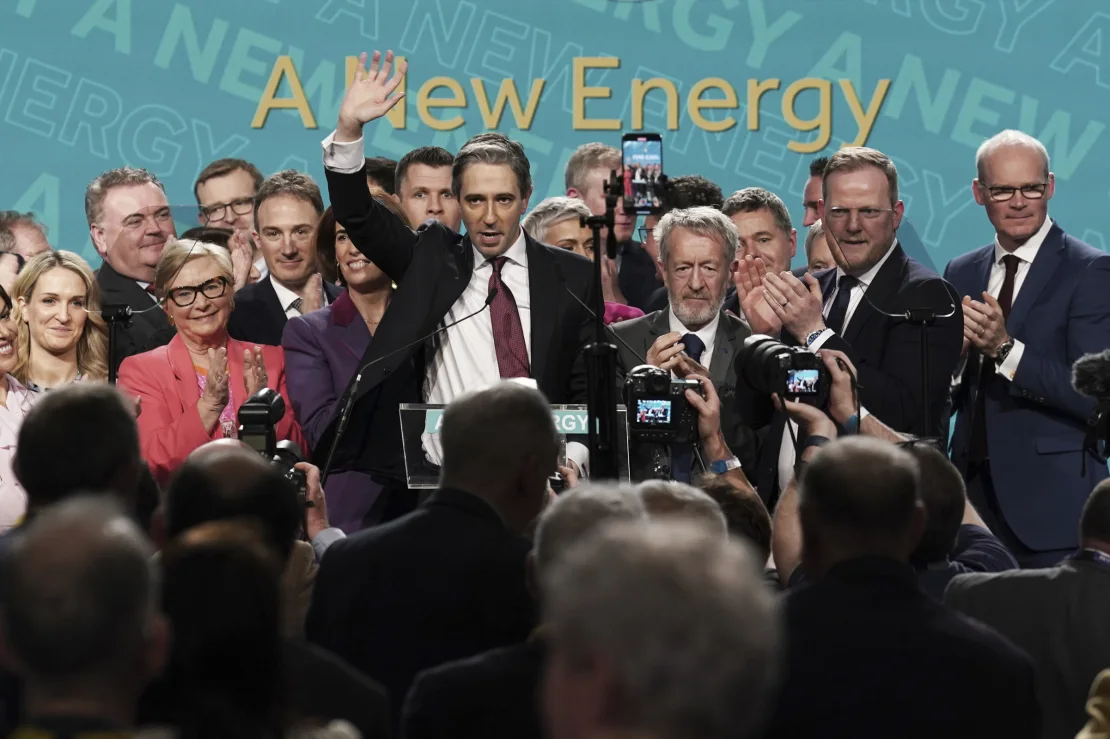Harris, 37, ran unopposed to replace Varadkar as leader of the ruling Fine Gael party, and the final formalities of his rise to power were completed in the Dáil, Ireland’s parliament.
He has held a number of government positions since being earmarked as a rising political star in his late 20s, most recently serving as the minister for higher education and science.
But Harris faces a daunting political challenge in the coming months; a general election in Ireland must be held by late March 2025, and Fine Gael is trailing in opinion polls to the Irish republican group Sinn Fein, which was once the political wing of the Irish Republican Army (IRA).
Varadkar led a charge to liberalize some of Ireland’s socially conservative laws, most notably easing the country’s strict anti-abortion mandates.
But his government faced backlash over Ireland’s housing crisis and soaring immigration numbers.
In his first speech after being elected, Harris condemned Israel for its conduct in Gaza, vowing “not to be silent” on the war in remarks that immediately make him one of the West’s most forceful critics of Israel.
“In Gaza, we are witnessing a humanitarian catastrophe. And we are seeing innocent children, women, and men being starved and slaughtered,” Harris told lawmakers in the Irish parliament. “We have not been silent on the unforgivable terrorist actions of Hamas on October the seventh. Nor can we be silent on the disproportionate reaction of the Israeli government.”
A TikTok taoiseach
Harris has been quick to praise his predecessor during his coronation as Fine Gael’s new leader, but his path to the top of Irish politics is unlike many of those who came before him.
The son of a taxi driver, born in eastern Ireland, Harris studied journalism and French at a Dublin university but dropped out to instead focus on politics. It was his brother’s diagnosis with autism, and his subsequent struggle to access special needs services, that propelled a teenage Harris’s political ambitions.
“I saw the stress and strain my parents went through, and called a public meeting in my hometown,” he told Irish magazine Hot Press in 2022. “I ended up finding myself politicised at a young age.”

He was a councillor, and then a member of the Dail, in just a few years. And Harris’s youth has been a feature of his political identity throughout his career. Anti-abortion campaigners held up banners reading “I fancy Simon Harris” in 2018. He famously told committee members to “chillax” six years earlier. “Didn’t realise chillax was such a big deal … was just fed up!” he wrote on Twitter amid the ensuing media fascination.
And in recent months, Harris has embraced the social media app TikTok, picking up nearly 100,000 followers. Irish Times Political Correspondent Jennifer Bray told CNN that strategy could become more prominent as an election approaches, with the bloc hoping he could “appeal to an increasingly distant electorate: younger voters.”
Harris was catapulted into the prominent role of health minister in 2016, a steep rise that cemented his position as one of Fine Gael’s new guard. He was seen as a potential leadership candidate as early as the following year, when premier Enda Kenny stepped down from his role, but the then-30-year-old ruled himself out, insisting he didn’t yet have the experience.
As health minister, Harris was prominent when Ireland voted to legalize abortion. He hailed the move as “a vote to end lonely journeys, end the stigma and support women’s choices in our own country.” He also fronted Ireland’s initial response to the pandemic, before being moved to a new brief in mid-2020 — a fortuitous shift that spared the popular politician the complexities of dealing with Ireland’s emergence from the Covid crisis.
But his time in the department was not without controversy. In 2018 a scandal erupted after the Irish health service was found to have provided incorrect smear tests for cervical cancer to more than 200 women. Harris later acknowledged that he personally had made mistakes in the handling of the scandal, saying there was no part of the episode “where there are not lessons to be learned and no-one escapes responsibility.”
Harris remained as minister for further and higher education, research, innovation and science until his elevation to party leader, which capped a speedy ascent through Ireland’s political hierarchy.
“I know, in many ways, my career has been a bit odd,” he told Hot Press in 2022. “Life came at me a lot faster than I expected it to.”
A host of challenges
Harris’s rise was fast, but his time at the top may be brief.
“I will take office when time is short, but there is so much to do,” he admitted when addressing his party last week. The shine of Varadkar’s government wore off during his second stint as taoiseach; Harris inherits a governing coalition facing a difficult fight to return to office.
A housing crisis has gripped Ireland, felt especially by younger voters whom Harris will be so keen to court. That, coupled a cost of living crunch and concerns over immigration, has helped diminish public support for the two traditional parties that have dominated Irish politics over the last century.
In their place, Sinn Fein has surged. The left-wing, Irish nationalist party has swept recent elections in Northern Ireland, and is also leading polls in the south.
Sinn Fein was once considered to be the political wing of the IRA, which fought a bloody three-decade military campaign to end British rule and unite the island of Ireland, though the party has since positioned itself as a grassroots left-wing political party focused on social issues on both sides of the border.
Its reemergence as the prominent political bloc on the island of Ireland has raised discussions about a so-called border poll on the reunification of Ireland, though that prospect still remains a distant one.
Harris told Sky News after his election as Fine Gael leader on Saturday that reunification is “a legitimate aspiration,” but added: “That’s not where my focus and priority is right now and quite frankly, it’s not where I believe our focus and priority should be.”
CNN’s Sophie Tanno contributed reporting

